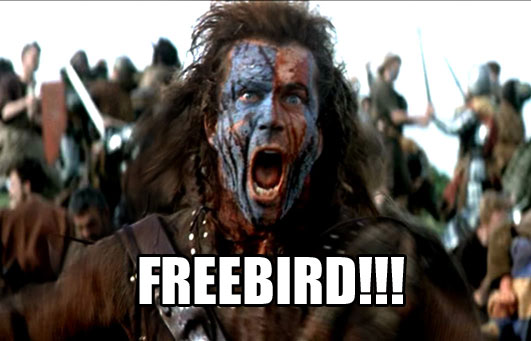Over on Popdose, I had the fun and privilege of collaborating with the staff on a list of the 100 greatest cover songs of all time. I wrote about eight or nine of the write-ups, though I missed the chance to tackle a couple of songs I would have enjoyed doing. More than that were some songs I had floated in my personal 100 list that didn’t make the final cut, about which I found myself really wanting to say something. One of these I tackled in an addendum to the Popdose article that will appear soon. A few others — three, to be precise — I am resurrecting and discussing below.
“That’s All Right,” Elvis Presely
Originally recorded by Arthur Crudup
My ranking: #7
One of the challenges the self-styled critic faces in compiling a list like this is the temptation to nominate songs because they’re “classics”: songs that mark a pivotal movement or moment without necessarily meaning anything to the critic on a personal level — precisely the level at which music should matter to us most. (This was the reason that the eventual Popdose winner, Aretha Franklin’s “Respect,” placed a relatively low 21 on my list: I recognize it as a great song, but I rarely stop to listen to it.) Bearing that in mind, I think I was on firm ground in naming this primal Elvis number to such a high place on the list. Say what you will about “Blue Suede Shoes;” for my money, this is where it begins, both for Elvis and for rock n’ roll in general. Its recording is one of rock’s great legendary origin stories. Having pestered local record producer Sam Phillips for ages for a chance to record, Elvis found himself struggling to get a passable performance of “I Love You Because,” the kind of schmaltzy ballad his mother loved. Between increasingly futile takes, Elvis and the hired musicians began messing around with this old Arthur “Big Boy” Crudup number, and Sam Phillips heard his young singer suddenly come to life. The rest we all more or less know, but you don’t need to know the rest to hear greatness here: the originality is palpable, the spontaneity of a kind almost completely vanished from modern music.
“Way Down in the Hole,” the Blind Boys of Alabama
Originally recorded by Tom Waits
My ranking: #13
OK, so a lot of people know this one as “The Theme to Season One of The Wire.” I get that. And I accept that my affection for this song is probably colored by my admiration for its use on that show. But it’s not hard to look past that association to an already great song become even greater. Tom Waits’ take on the song is laced with his customary and distinctive irony, a subtle flavoring of the material that, rather than undercutting the song’s spiritual content, seems to afford it a range of plausible interpretations. The Blind Boys of Alabama by contrast serve it up straight, opening a window directly onto a rich musical and spiritual tradition that Waits views through a funhouse mirror. I’m an atheist, but I still know a great spiritual when I hear one.
“Mr. Moonlight,” the Beatles
Originally recorded by Dr. Feelgood and the Interns
My ranking: #79
This may well be the most underappreciated and misunderstood track in the Fabs’ canon. Ian MacDonald in Revolution in the Head called it “excruciating.” Jonathan Gould in Can’t Buy Me Love thought it “falls completely flat.” I happen to love John Lennon’s unhinged vocal, the comically straight backing vocals by Paul and George, and of course that organ solo, as though a member of the Lawrence Welk Orchestra popped into the Cavern on a bet and decided to briefly sit in with the house band. In fact, far from being an aberration, this is exactly the kind of song the Beatles loved to do — a vital and often-forgotten element of their greatness. For one thing, it was obscure; it actually came out as a B-side, a favorite tactic of theirs to ensure no competing act would be playing their material. For another, it was goofy — the Beatles relished taking oddities like this and turning them into raving rock n’ roll songs. And finally, it helped to fill out what were often extremely long sets: the Beatles played for as long as eight hours some nights, forcing them not only to become tight, accomplished musicians but also to assimilate nearly any raw material into their act and make it their own. If you had happened to stumble into the Star Club in Hamburg in 1961, or the Cavern in Liverpool, this song or something like it is probably what you would have heard: an R&B relic given an unlikely second life by the greatest cover band in rock history.
 Today on Popdose I published a piece making fun of people who yell “Freebird” at concerts. (I know, I know. Tomorrow I’m going to write a piece making fun of airline food.) I don’t usually post links to stuff I write on other websites, but I wanted an excuse to use the above graphic. I created it to go with the story but ended up using another one, and didn’t want this one to go to waste. It kind of freaks me out, truthfully. Don’t look at it too long.
Today on Popdose I published a piece making fun of people who yell “Freebird” at concerts. (I know, I know. Tomorrow I’m going to write a piece making fun of airline food.) I don’t usually post links to stuff I write on other websites, but I wanted an excuse to use the above graphic. I created it to go with the story but ended up using another one, and didn’t want this one to go to waste. It kind of freaks me out, truthfully. Don’t look at it too long.